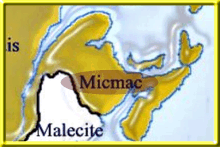
The Haida people are an indigenous nation of the coast of British Columbia, Canada. They have a rich and diverse cultural heritage that dates back thousands of years.
According to Haida oral traditions, their ancestors have lived in Haida Gwaii (the Queen Charlotte Islands) since the beginning of time. Haida society was divided into two matrilineal moieties (Raven and Eagle) and was organized into complex clans. The Haida were known for their elaborate art and architecture, including massive totem poles, canoes, masks, and jewelry.
In the late 18th and early 19th centuries, contact with European explorers and traders brought new influences to Haida society, including weapons, trade goods, and diseases such as smallpox. The arrival of Christian missionaries in the late 19th century brought further changes to Haida culture and beliefs.
In the late 19th and early 20th centuries, the Haida and other Indigenous peoples in Canada faced a wave of cultural assimilation and suppression by the Canadian government. This included the forced removal of Indigenous children from their families to attend residential schools, where they were forbidden to speak their own languages or practice their cultural traditions.
Despite these challenges, the Haida people have continued to maintain their cultural heritage and traditions. Today, the Haida people are actively working to revive their language, arts, and other cultural practices, and to assert their rights as Indigenous peoples.
Here are some important events and dates in Haida history:
Pre-contact era: Haida oral traditions suggest that their ancestors have lived in Haida Gwaii for thousands of years, long before the arrival of European explorers.
1774: Spanish explorer Juan Perez became the first European to make contact with the Haida.
Late 18th and early 19th centuries: Haida society was impacted by contact with European explorers, traders, and whalers, who introduced new goods, technologies, and diseases to the region.
1884: The Canadian government declared the Haida Gwaii archipelago to be a reservation, effectively denying the Haida sovereignty over their traditional territories.
Late 19th and early 20th centuries: The Haida and other Indigenous peoples in Canada were subjected to a policy of cultural assimilation and suppression, including the forced removal of Indigenous children from their families to attend residential schools.
1985: The Haida Nation sued the Canadian government for violating their rights and title to Haida Gwaii, in what became known as the "Delgamuukw case".
1998: The Supreme Court of Canada issued its ruling in the Delgamuukw case, recognizing the existence of Indigenous title in Canada and affirming the Haida's rights to their traditional territories.
2009: The Haida Gwaii Reconciliation Act was passed, recognizing the rights and title of the Haida Nation and establishing a framework for reconciliation between the Haida and the government of Canada.
2020: The Haida Nation declared a state of emergency due to the COVID-19 pandemic, and took measures to protect their communities and maintain their cultural traditions during this challenging time.
